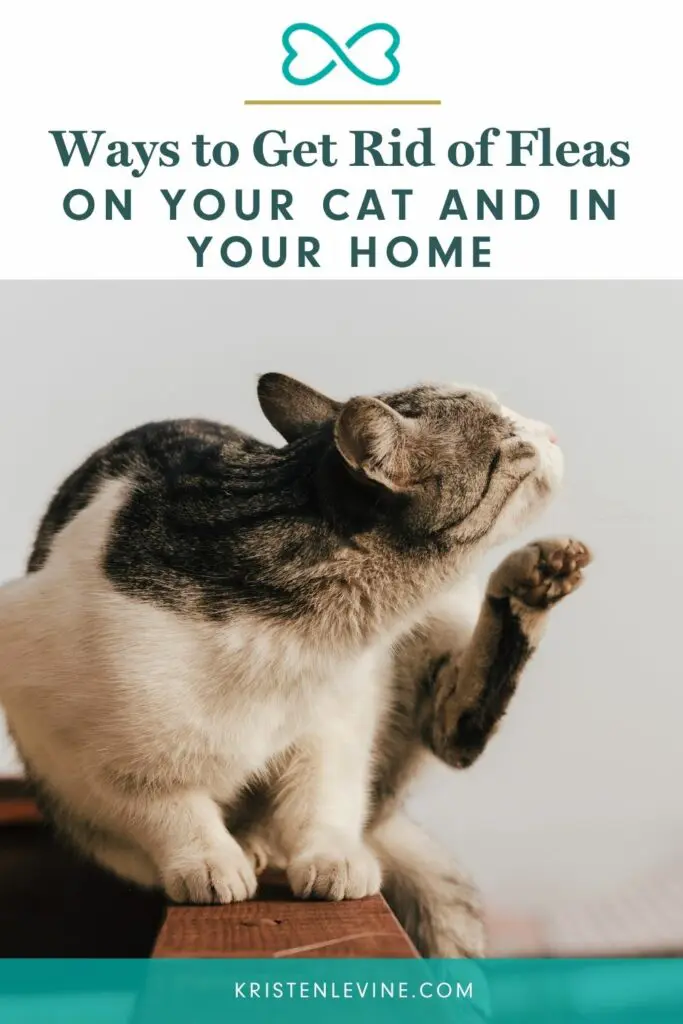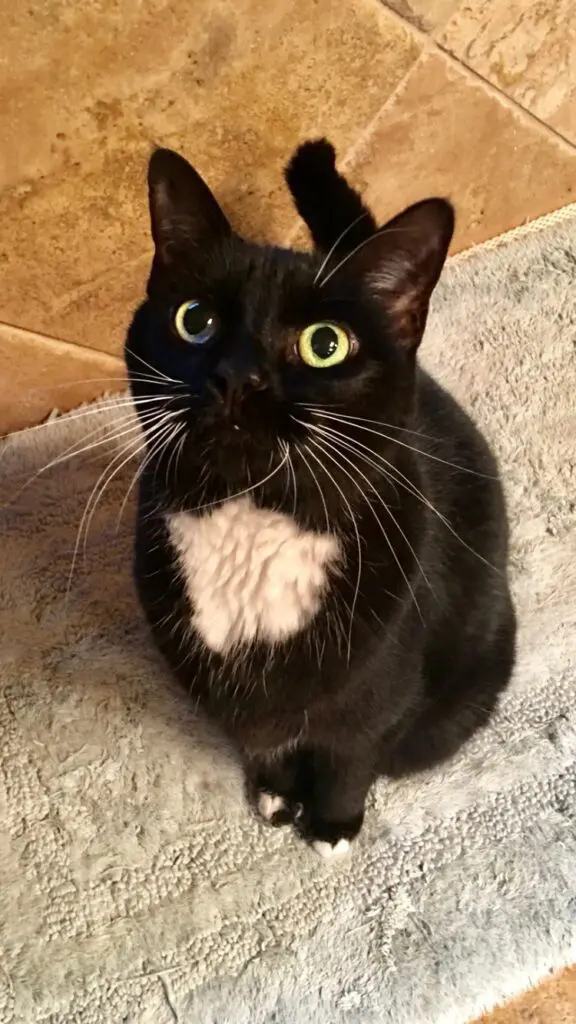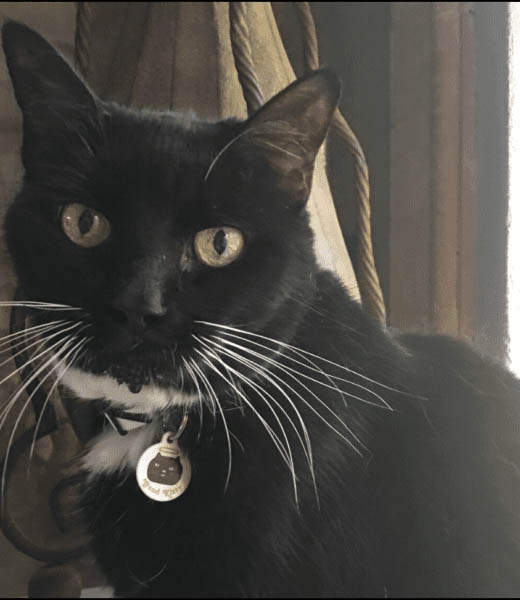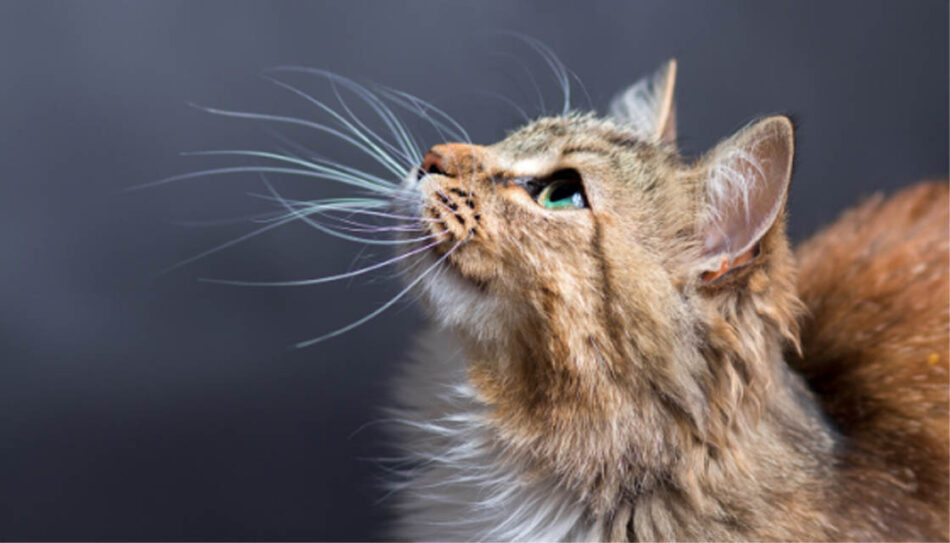
How to Get Rid of Fleas on Cats and Inside Your Home
This post may include affiliate links. Please read my disclosure policy.
Whether your cat is an indoor cat (always the safest!) or one who roams, the potential for cat fleas is always lurking. It’s not only frustrating but rather annoying and gross when you find fleas on your cat or inside your home.
So if keeping cats inside doesn’t prevent a flea infestation, what does?
Pin Me!

I knew how these pesky parasites operate: tiny, hard-to-spot little creatures that like to jump leaps and bounds, hiding in pet fur and feasting on their blood. Gross!
My indoor cat, Olivia, has had her share of flea bites through the years, so I’d like to share what I’ve learned about how to successfully prevent and rid both your feline friend and your home of fleas.
How Does an Indoor Cat Get Fleas?

As it turns out, indoor cats aren’t protected from critters like fleas and ticks just because they reign over an indoor domain. In fact, during the warmer months, you’re more likely to be visited by these uninvited guests.
But don’t be fooled; fleas and ticks are a threat all year round. That includes the winter months and in colder climates. Flea eggs can also lay dormant for months before they hatch.
These creepy crawlies are expert hitchhikers who can sneak into your home in the fur of other pets, on the clothes of visiting friends, or even on you! Adult fleas in particular use their powerful back legs to jump onto pets or people as they walk by.
Cat fleas can lay up to 50 flea eggs per day. No wonder these pests are notoriously hard to evict!
And to make matters worse, since cat fleas are so tiny—sometimes as small as a pinhead—you may not notice them right away. I promise these aren’t scare tactics. But I hope by now you’re asking yourself, “Does my cat have fleas?”
If your kitty has excessive scratching, biting, or licking, these might be the first signs that something’s wrong. Adult fleas and ticks on your cat’s skin can make life extremely uncomfortable for your feline bestie. Not to mention, one single flea bite could lead to an allergic reaction, causing her to need costly treatment.
How to Know if Your Cat Has Fleas
The best way to know if your kitty has fleas is to give her a thorough check. Look closely at her skin and coat. While you’re at it, be sure to check all of her vitals for any other health issues.

Here are some tell-tale signs your cat has fleas:
- Excessive scratching, biting, and licking
- Hair loss
- Black specks in your cat’s fur
- Red skin legions or scab-like bumps
- Behavioral changes, perhaps including excessive vocalization
If you notice any of these signs, it’s time to fight those fleas!

How to Prevent Fleas and Ticks from Entering Your Home
Prevention is key! Speaking from experience, being proactive is the best way to tackle a flea problem and prevent future infestations. Here are the solutions I love and use for my own pets:
Vacuum Regularly
This is especially important for flea prevention, as it helps stop fleas from taking over your home. Pay extra attention to your cat’s favorite areas such as her bed, feeding area, tower, favorite pillow, etc. But keeping the entire home clean will help to avoid flea infestations since, at any given time, 57% of fleas in a person’s home are in the larval stage. You don’t want those flea eggs to hatch!
Finally, make sure you empty your vacuum’s canister after you’re finished.
Also, make sure you get to the cracks between flooring and crevices on certain furniture, like cupboards. Adult fleas and flea larvae could be hiding in those places!
Here are my favorite vacuums for homes with pets.
Keep the Grass and Hedges Around Your Home Trimmed
Adult fleas like to hide out in tall grass, bushes, and shady areas. They lurk there, lying in wait for a person or animal to walk by so they can jump on their next host. Keeping the yard well-manicured can help to prevent a flea infestation. Make sure to rake out leaves to avoid creating damp areas, and trim hedges and bushes to allow the sunlight to dry out those areas.
Keep Your Cat Clean and Groomed
Lastly, make your cat’s fur an unwelcoming host for fleas. We know just how warm and snuggly our cats are. Unfortunately, so do fleas and ticks. In fact, your cat’s warm furry body is the perfect home and breeding ground for these little pests. So it’s important to keep your cat well-groomed and regularly check for evidence of fleas before you get a flea infestation on your hands.
Flea comb for cats: A flea comb is designed for both short- and long-haired cats and is great at removing fleas without disturbing your kitty’s sensitive skin. Using a flea comb regularly helps keep those pesky fleas away in the long run. So grab that flea comb and make it a part of your usual pet care routine. It’s a simple yet effective way to help keep the fleas at bay.
Vet’s Best Flea & Tick Waterless flea shampoo: Now, if you find that the fleas are still being stubborn, it might be time to use a good flea shampoo. Most cats aren’t crazy about being in the water, so this waterless flea and tick shampoo will be great to use (and will keep our arms and hands scratch-free!).. Flea shampoos are specially formulated to tackle the job of treating fleas on your kitty. After applying this shampoo and letting it dry, go back to using your trusty flea comb to make sure you’ve gotten rid of all the freeloaders.
Vetericyn® FoamCare Medicated Shampoo: Even after treating fleas, you might notice your cat is still itching away. This spray-on, instant-foaming shampoo relieves itching, dry spots, and other skin issues, making the whole experience a lot less stressful for both you and your furry friend.
Save 20% on Vetericyn® FoamCare Medicated Shampoo with code: PETLIVING.
Vetericyn Plus® Feline Antimicrobial Hydrogel: If your cat has been scratching or biting affected areas, then this spray will soothe her itchy skin. It’s pain-free and safe to use around her mouth, nose, ears, and eyes. Plus it’s veterinarian recommended and a great solution for cats with sensitive skin.
How to Get Rid of Fleas in the House and on Your Cat
Even with the most earnest preventative efforts, fleas may still find their way into your home. Or you might be reading this because you already have an infestation and you’re looking for ways to get rid of it.
At this point, it’s important to talk to your veterinarian about the proper flea treatment for your cat and home. While there are numerous over-the-counter solutions, not all flea treatments are created equal!
In fact, one popular flea collar has been linked to the death of nearly 1,700 pets! In addition, many pet parents may not realize that most flea treatments for cats are different than flea treatments for dogs, and trying to use them interchangeably can make your cat sick or even lead to death. This is especially true if your pet’s weight is not taken into consideration.
Prescription flea medication is always the safest route, as it’s prescribed and monitored by your veterinarian. I’ve used Comfortis with great success in the past. These chewable tablets can treat fleas on cats for up to one month. With medications such as these, as your cat moves about the house and “collects” fleas, the medication will kill the fleas without harming your cat. You can even buy it on Chewy.com once you have your veterinarian’s approval.
If your cat is a picky eater and has difficulty with chewable pills, you can use a topical solution, like Bravecto Plus. This prescription medication not only combats fleas on cats but also protects them from heartworm, ticks, and intestinal parasites. This is also available on Chewy.com with authorization from your veterinarian.
Once you’ve treated your cat for fleas, it’s time to evict them from your house! Start by washing all your bedding in hot soapy water. Be sure to include any of your cat’s bedding or favorite blankets where kitty likes to nap.
Vacuum your home thoroughly. Remove the vacuum bag immediately. Then seal and remove it from your home. Be sure to use a high-quality, powerful vacuum to remove any fleas and all the eggs they’ve laid. Here are my favorite vacuums to get rid of pet hair and fleas in your house.
Remember, it’s not a pet parent fail if fleas or ticks find their way into your home or onto your fur family. Those little pests are crafty! But now that you’re armed with these straightforward solutions on how to get rid of fleas on cats, kick those annoying pests out of your home and make your cat (and you) happy and comfortable again!








Comments (0)